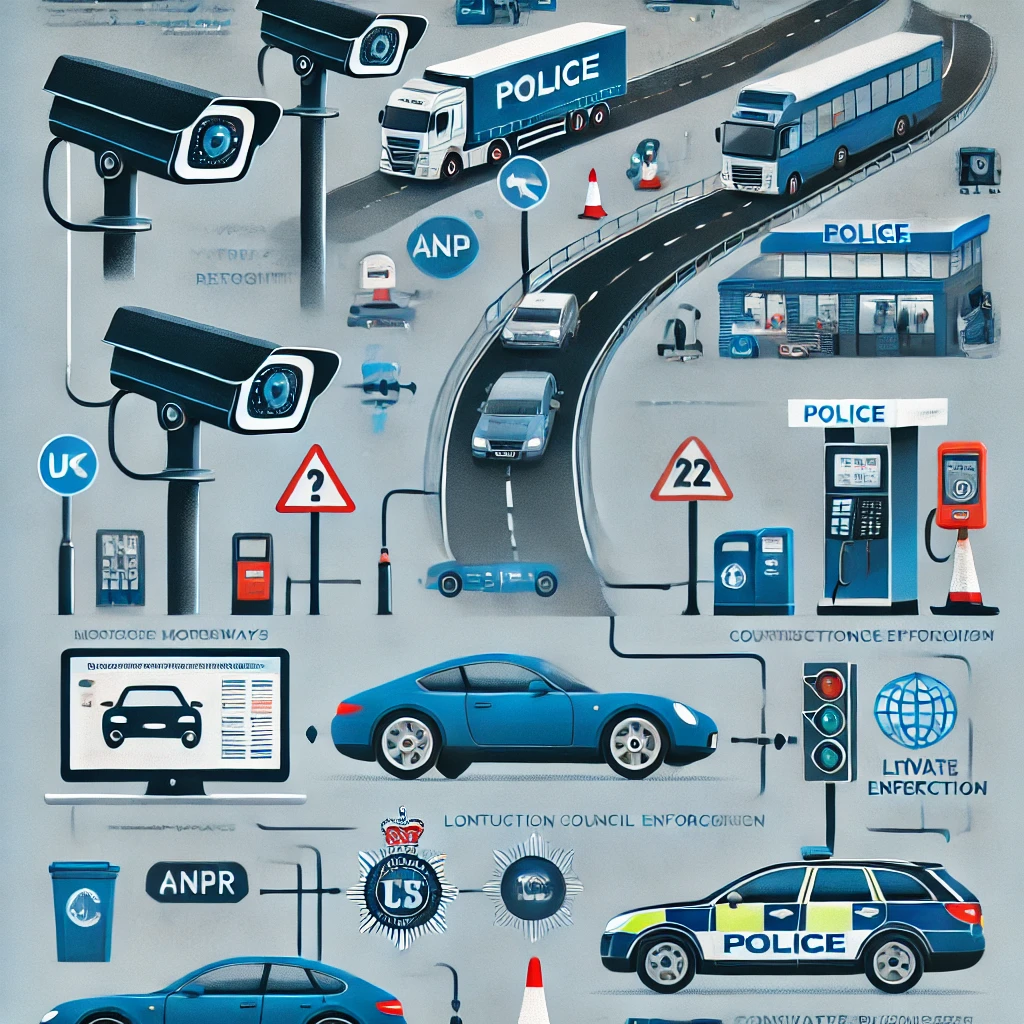
How to Obtain ANPR Data for Investigations in the UK
Automatic Number Plate Recognition (ANPR) technology is crucial in UK law enforcement, vehicle tracking, and fraud investigations. While police have direct access to national ANPR databases, private investigators, legal professionals, and businesses must follow strict procedures to obtain ANPR data legally.
This guide will explore how ANPR works, who can access it, and how to request ANPR data for investigative purposes legally.
What is ANPR and How Does it Work?
ANPR cameras automatically capture vehicle registration plates, using Optical Character Recognition (OCR) to convert them into digital data. These cameras are widely used on motorways, fuel stations, shopping centres, toll booths, and car parks, with data stored by various entities, including:
- Police National ANPR System – Used for crime prevention, traffic enforcement, and security.
- Local Council ANPR – Deployed for congestion zones, bus lanes, and parking enforcement.
- Private ANPR Networks – Shopping centres, petrol stations, and parking operators store plate data for business security.
ANPR data can be invaluable for investigating stolen vehicles, fraud, missing persons, and organised crime. However, accessing this data requires a legal basis and compliance with the UK GDPR and the Data Protection Act 2018.
Who Can Access ANPR Data?
1. Police and Government Agencies
UK police forces, the DVLA, and HMRC have direct access to ANPR databases for law enforcement and taxation purposes.
2. Local Authorities
Councils use ANPR for parking fines, traffic enforcement, and congestion charge zones (e.g., London’s ULEZ scheme).
3. Private Companies & Investigators
- Private investigators do not have direct access to police ANPR records.
- However, they can obtain ANPR data from private networks (car parks, retail parks, toll roads).
- Legal requests can be made under the UK GDPR and the Data Protection Act 2018.
How ANPR Data Can Be Used in Investigations
1. Stolen Vehicle Investigations
If a vehicle has been stolen, ANPR records may help locate it. Investigators can:
✔ Contact car parks, toll roads, and petrol stations to check for sightings.
✔ Request ANPR records from private security firms.
✔ Use Subject Access Requests (SARs) to obtain vehicle data.
2. Insurance Fraud & Staged Accidents
ANPR data can verify whether a vehicle was present at an accident scene. Investigators can:
✔ Check council ANPR records for location history.
✔ Request private ANPR data from car parks and retailers.
✔ Use court orders to compel data disclosure in legal cases.
3. Missing Persons Investigations
ANPR data can provide vital leads if a missing person’s car is still in use. Investigators can:
✔ Contact motorway service areas, petrol stations, and local councils.
✔ Use ANPR data to track movement patterns.
✔ Work with police if a criminal investigation is involved.
4. Retail Theft & Organised Crime
Suspects using vehicles in theft or fraud cases can be identified using ANPR. Investigators can:
✔ Request ANPR data from retail parks and shopping centres.
✔ Cross-check crime reports with vehicle movement data.
✔ Use ANPR evidence to establish patterns of criminal behaviour.
How to Legally Request ANPR Data in the UK
Investigators must follow strict legal procedures when requesting ANPR data. The main options include:
1. Subject Access Requests (SARs) for Personal Vehicle Data
- Individuals can request their own ANPR records under UK GDPR Article 15.
- The vehicle’s registered keeper can submit a request to ANPR operators (e.g., a council or parking firm).
- Proof of identity (e.g., V5C logbook, driving licence) is required.
2. Freedom of Information (FOI) Requests for Public Data
- Councils sometimes hold anonymised ANPR data.
- Investigators can submit an FOI request to obtain general vehicle movement patterns in public spaces.
- Note: FOI does not grant access to personal vehicle data.
3. Court Orders & Legal Requests
- In civil and criminal cases, courts can order ANPR data disclosure.
- Investigators working with legal teams may request ANPR data via a solicitor.
- Court orders are typically needed to access police-held ANPR records.
Template: Legal Request Letter for ANPR Data
Below is a template for formally requesting ANPR data from a private company, local council, or other ANPR data holder.
[Your Name]
[Your Address]
[Your Email]
[Your Phone Number]
[Date]
[Recipient’s Name or Data Protection Officer]
[Company/Organisation Name]
[Address]
[Email (if available)]
Subject: Request for ANPR Data Under the Data Protection Act 2018 / GDPR
Dear [Recipient’s Name/Data Protection Officer],
I am writing to formally request access to Automatic Number Plate Recognition (ANPR) data held by [Company/Organisation Name] in relation to the following vehicle:
- Vehicle Registration Number (VRN): [Insert VRN]
- Make & Model: [Insert Make & Model]
- Owner/Registered Keeper: [Your Name or Client’s Name]
- Date & Time Range of Interest: [Specify date(s) and time(s)]
- Location(s) of Interest: [Specify car park, road, or area where ANPR cameras may have recorded the vehicle]
Legal Basis for Request:
This request is made under:
- Article 15 of the UK General Data Protection Regulation (UK GDPR) and Section 45 of the Data Protection Act 2018 grant individuals the right to access their personal data.
- If acting on behalf of a client, a signed authorisation letter from the registered keeper is attached.
- A court order or legal justification may be provided upon request if related to an active legal case.
Information Requested:
I kindly request the following information related to the vehicle’s ANPR records:
- Date, time, and location of any captured images of the vehicle.
- Copy of the ANPR images and corresponding timestamps.
- Any associated metadata (e.g., direction of travel, camera reference ID).
If this data is stored and accessible, please provide it in electronic format (e.g., PDF, JPEG images, or CSV data) as soon as possible.
Response Time & Contact Details:
Under UK GDPR, you must respond within one calendar month of receiving this request. If further clarification is required, please get in touch with me at [Your Email] or [Your Phone Number].
I appreciate your cooperation and look forward to your response. If the data cannot be provided, please specify the reason for refusal and any applicable exemptions under the Data Protection Act 2018.
Yours sincerely,
[Your Full Name]
[Your Role, if applicable]
[Your Contact Details]
Final Thoughts
ANPR data is a powerful investigation tool, but access is highly restricted. While police and government agencies can use ANPR freely, private investigators and legal professionals must follow strict legal pathways to request data.
Key takeaways:
✔ Use Subject Access Requests (SARs) for personal data.
✔ Submit FOI requests for anonymised data from councils.
✔ Obtain court orders for legal cases requiring ANPR evidence.
✔ Contact private ANPR networks (car parks, petrol stations) where necessary.
Would you like guidance on specific ANPR request strategies or help with a legal case? Let us know in the comments!



